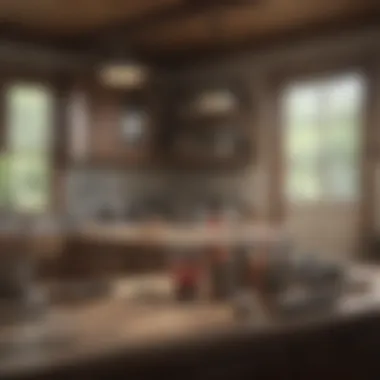House vs Townhouse: A Detailed Comparison Guide


Intro
The decision to buy a home is often one of the most significant choices in a person's life. Whether you’re looking to settle down or searching for a sound investment, the options of buying a house or a townhouse come with their own unique set of advantages and challenges. The real estate landscape can be fully daunting, with mighty considerations that extend beyond just price tags and square footage. This is where the importance of making a perfectly informed choice becomes klar. It’s crucial to weigh not only financial factors but also lifestyle preferences, future goals, and maintenance responsibilities.
Key Terms and Definitions
Before diving into the merits and downsides of each option, let’s clarify some essential terms to ensure we’re all on the same page.
Real Estate Terms
- Single-Family Home: A standalone structure meant for one household, often with its own yard or garden.
- Townhouse: A multi-floor home that shares one or two walls with adjacent properties but has its own entrance.
- HOA (Homeowners Association): An organization that manages the common areas of a community, often associated with townhouse developments.
- Equity: The value of an owner’s interest in a property, calculated by subtracting any mortgage or loan balance from the property’s market value.
Investment Vocabulary
- Cap Rate (Capitalization Rate): A measure used to evaluate a real estate investment’s profitability.
- Appreciation: The increase in a property’s value over time.
- Liquidity: The ease with which an asset can be converted to cash. Real estate generally has lower liquidity compared to stocks or bonds.
Financial Implications of Buying a House vs Townhouse
When we’re talking money, it’s vital that buyers grasp the financial intricacies of each option. Purchasing a house often involves greater upfront costs. Think down payment sizes, taxes, and possibly higher insurance premiums. On the flip side, townhouses usually offer a more affordable entry point into real estate ownership. However, they come with Homeowners Association fees that can add up quickly, covering everything from landscaping to shared amenities.
"Just because the sticker price looks lower, doesn’t mean you are saving in the long run. Always calculate total ownership costs!"
Detailed Cost Breakdowns
- House Financials:
- Townhouse Financials:
- Down Payment: Generally ranges from 3% to 20% of the purchase price.
- Taxes and Insurance: Higher assessed value leads to elevated costs.
- Maintenance: Homeowners carry the full brunt of upkeep expenses.
- Lower Initial Price: Entry barriers can be less intimidating.
- HOA Fees: Frequently recurring fees that can influence monthly budgeting.
- Shared Maintenance: Costs and responsibilities for common areas are typically divided.
Lifestyle Considerations
Lifestyle can be a huge determining factor for buyers. Do you appreciate a communal atmosphere and shared amenities? Or do you prefer the privacy and independence a house can afford?
The House Advantage
- Space: More square feet means more room for customization and expansion.
- Privacy: Less direct noise from neighbors and more exclusive outdoor space.
The Townhouse Advantage
- Community Feel: Many buyers enjoy the camaraderie of living close to others.
- Less Maintenance: If you want to enjoy life rather than dealing with repairs, a townhouse might be for you.
Expert Advice
Tips for First-Time Buyers
- Research Locations: Understand neighborhood dynamics and the real estate market trends.
- Consult Financial Advisors: Whether you’re looking at a house or a townhouse, get professional budgeting assistance.
- Visit Multiple Listings: Seeing various styles enables better comparisons to aid your decision-making.
Understanding Your Risk Tolerance
Buying property is a long-term commitment. Reflect on your comfort level with market volatilities in real estate. Houses may appreciate more in booming areas, but townhouses can offer steadier, if slower, returns.
The End
When it comes down to it, there's no one-size-fits-all answer to the house vs townhouse dilemma. Each individual's situation can dramatically influence the best choice. Whether you find appeal in spacious grounds or opting for a lower maintenance solution, understanding the nuances will empower your decision making. Stay tuned for further sections that will break down these elements more methodically.
Foreword
When pondering the prospect of home ownership, many find themselves at a crossroads: should one invest in a traditional house or a townhouse? This decision holds substantial weight, shaping financial futures, lifestyle choices, and even social environments. A house often signifies independence, offering vast personal space and the freedom to modify one’s dwelling at will. In contrast, a townhouse typically blends the benefits of private ownership with community living, potentially appealing to those who prioritize convenience and shared amenities. This article will take a focused look into these key contrasts, shedding light on financial implications, lifestyle impacts, and maintenance responsibilities.
Understanding these differences is not merely an academic endeavor; it can profoundly influence individual circumstances. For instance, while a house may provide greater privacy, it comes with maintenance responsibilities that can quickly pile up. Townhouses, on the other hand, frequently incorporate homeowner association (HOA) services, which can alleviate certain burdens but may also impose restrictions.
"A home isn’t just bricks and mortar; it’s the gateway to your life's experiences," so one must weigh the options thoroughly before making a leap.
By examining this topic in detail, we aim to equip prospective buyers with insights tailored to their financial capabilities and lifestyle aspirations. Moreover, understanding the nuances involved in each choice can clarify not just the purchasing process, but also the ongoing commitment of home ownership—from potential market values to the intricacies of everyday living. Let’s delve into these contrasting worlds to aid you in your journey toward finding your perfect place.
Defining House and Townhouse
Understanding the difference between a house and a townhouse serves as a cornerstone in the decision-making process when considering where to plant one's roots. Both options offer distinct lifestyles and financial implications, yet they appeal to different priorities and preferences. As potential buyers embark on this journey, clarifying these definitions helps to illuminate the path ahead, guiding individuals toward a choice that aligns with their personal circumstances.
Characteristics of a House
A house typically stands alone and features its own plot of land, which provides freedom and privacy. Owning a house means you can generally come and go as you please, and make modifications without seeking approval from a homeowners association (HOA). Here are some notable attributes:
- Space: Houses often offer more square footage than townhouses, accommodating larger families or those who simply appreciate having room to spread out.
- Yard and Landscaping: Many homes come with a front and back yard, ideal for gardening, barbecue parties, or just relaxation.
- Autonomy: As an owner, you have complete control over maintenance, improvements, and alterations. Want to paint your house bright pink? Go for it.
- Potential for Appreciation: A house often appreciates in value more significantly over time compared to other dwellings, depending on neighborhood trends.
In essence, the independent nature of house ownership might appeal to those looking for both space and control in their living situation.


Characteristics of a Townhouse
Townhouses, on the other hand, are typically built in rows and share walls with one or more neighboring units. They combine the benefits of both apartments and houses. While the space might feel confined in comparison, the efficiency can be appealing. Consider these features:
- Affordability: Townhouses often come with a lower purchase price than standalone houses, making them more accessible for first-time buyers or those on a tighter budget.
- Shared Amenities: Many townhouse communities offer amenities such as pools or gyms, creating opportunities for socializing.
- Less Maintenance: Exterior upkeep is often handled by an HOA, which means less work for the homeowner regarding landscaping and maintenance.
- Community Feel: Townhouses are generally located in closer proximity to neighbors, fostering a sense of community and camaraderie that some individuals find appealing.
In summary, a townhouse can appeal to those who prioritize cost, community, and less maintenance over expansive living spaces and complete autonomy.
"Choosing between a house and a townhouse is akin to deciding between solitude and community. The choice runs deeper than mere square footage; it reflects one's lifestyle preferences and values."
Financial Considerations
In the realm of real estate, financial considerations hold an undeniable weight in guiding buyers toward their ideal property. It’s crucial to evaluate not only the initial costs when making a purchase but also the ongoing expenses associated with homeownership. The ability to manage these financial commitments can determine the viability of a house or townhouse as a long-term investment.
When weighing the benefits of each property type, an understanding of financial obligations is essential to make an informed choice that aligns with one’s budgetary constraints and investment goals.
Initial Purchase Costs
The initial purchase costs are often the first hurdle in the home-buying journey. These can vary significantly between a house and a townhouse. Factors such as location, size, and condition of the property all impact the final price. For instance, detached houses typically demand a higher purchase price compared to townhouses due to the land ownership and increased privacy they offer.
- Down Payment: This is usually a substantial upfront requirement. While most standard mortgages require about 20% of the home's price, some loans allow for lower down payments. However, going low can mean getting stuck with private mortgage insurance (PMI).
- Closing Costs: These may include loan origination fees, title search fees, and appraisals, often ranging from 2% to 5% of the purchase price. This becomes especially critical in a buyer's market where negotiations may lower some costs.
- Inspection Fees: Don't forget about hiring inspectors. It could cost a few hundred dollars but it’s worth it to avoid potentially expensive repairs down the line.
A savvy buyer must consider these factors holistically, as they can reshape the financial landscape of owning either type of property.
Long-Term Maintenance Expenses
Once the ink dries on the purchase agreement, the wallet stays open. Long-term maintenance costs are pivotal in elucidating the financial viability of owning a house or townhouse. Generally, larger spaces tend to have higher maintenance demands, and houses certainly have an upper hand here.
- Routine Repairs: This can include painting, roof repairs, or plumbing issues. With a house, these can pile up especially if you prefer a DIY approach. In contrast, many townhouses benefit from shared maintenance agreements that cover a range of outside repairs.
- Landscaping & Utilities: Owning a house means you’re responsible for your own yard, which might necessitate regular upkeep and additional utility costs for larger spaces.
- HOA Fees: In a townhouse setting, these often serve as a buffer against surprise repairs and maintenance but can add up and affect overall affordability.
Ultimately, the choice between a house and a townhouse must consider these long-term costs which can greatly influence potential profitability down the roads, like selling or renting out.
Property Taxes and Insurance
Property taxes and insurance are integral to understanding the full scope of financial obligations. These costs vary widely depending on the type of property and its location.
- Property Taxes: Townhouses often come with lower property taxes since they are generally smaller and located within the specific assessment areas. Conversely, houses, being standalone properties, might come with higher tax bills, but this entirely depends on the local tax regulations.
- Homeowners Insurance: Insurance is usually more costly for houses. The increased value and risk of larger properties mean higher premiums. Townhouses can sometimes benefit from lower premiums through collective policies if they're governed by a homeowner's association.
The key here is to research tax rates and insurance requirements in your desired neighborhoods to accurately assess the total financial burden of each property.
"Understanding financial considerations is not just about buying a property; it's about securing your future investment."
Grasping these financial aspects marks a pivotal step toward informed property ownership and investment success.
Lifestyle Differences
When it comes to choosing between a house and a townhouse, understanding lifestyle differences can greatly influence the decision-making process. This aspect goes beyond mere architectural distinctions; it intertwines core values, daily routines, and personal preferences. Evaluating how each option aligns with one’s lifestyle can make the difference between a house feeling like a home or a townhouse fitting seamlessly into one’s personal narrative.
In this analysis, we will peel back the layers of lifestyle implications that surround these two living arrangements. This includes the space available and the community dynamics in which they are situated. Both of these elements play critical roles in shaping how individuals or families interact with their living situations.
Space Considerations
Space is often a double-edged sword in the house versus townhouse debate. Typically, houses offer more spacious interiors, likely featuring backyards, gardens, and potential for expansion. This can be particularly appealing for families with children or those who simply enjoy the luxury of space. However, larger spaces come with their own set of management challenges. Keeping up with a lush garden can require a good amount of time and energy that not everyone can commit.
On the other hand, townhouses usually present more compact living arrangements, designed for efficiency and ease of maintenance. For individuals or couples that prioritize a minimalist lifestyle, a smaller footprint can be both attractive and liberating.
Moreover, space is not just about square footage. It’s also about how individuals use the space they have. For instance, townhouses can have innovative layouts that maximize vertical space or multifunctional rooms. This makes them an attractive proposition for young professionals who value stylish, yet practical living.
- Pros of larger space in houses:
- Cons of larger space:
- Pros of compact townhouse living:
- Cons of compact living:
- Ample outdoor space for activities
- More room for hobbies and storage
- Time-consuming upkeep
- Higher utility bills
- Easier to maintain
- Potentially lower utility costs
- Possible limitations on personal expression in layout
- Less privacy when it comes to noise from neighbors
Community and Amenities
The community one lives in can significantly shape daily life. Townhouses might often be set within planned communities that offer shared amenities such as pools, parks, and fitness centers. This kind of environment can foster a sense of belonging and provide opportunities for social interactions. In bustling cities or suburban areas, this is often a big draw, making it easier for newcomers to find their footing and build connections.
Conversely, houses often reside in more diverse neighborhoods, where individual character reigns supreme. This means that a family can have neighbors across a wide spectrum, leading to unique relationships and potentially enriching experiences. However, this diversity comes with its trade-offs. There may be less communal facilities, requiring independence and self-sufficiency among residents.
It’s worth noting that both living situations offer their unique charm, but often a townhouse community will have more structured interactions, whereas houses may offer a sense of quiet autonomy.
- Benefits of townhouse communities:
- Drawbacks of townhouse living:
- House community benefits:
- House community drawbacks:


- Ready-made social circles
- Shared maintenance responsibilities
- Rules imposed by homeowners associations
- Limited control over property modifications
- Greater privacy and freedom
- Opportunities for unique relationships with neighbors
- Less access to shared amenities
- More effort required to build local connections
In summary, when weighing your options between a house or a townhouse, reflect deeply on how these factors align with your aspirations and lifestyle. The differences in space and community dynamics play substantial roles in your overall living experience. This choice, however straightforward it may seem, can dramatically shape the contours of daily life.
Maintenance Responsibilities
When contemplating the purchase of a house versus a townhouse, understanding maintenance responsibilities is crucial. It can greatly influence the living experience and overall financial commitment. Each option presents distinct maintenance scenarios that potential buyers need to be aware of before making a final decision.
Doing regular upkeep on a property can be likened to keeping the wheels of a car in tip-top shape; neglect can lead to complications that can be costly down the line. Knowing what falls on your shoulders and what can be handled by others is key to ensuring you don’t bite off more than you can chew.
Self-Maintenance vs. HOA Services
When you buy a house, generally speaking, you are the captain of your ship. This means that you are responsible for everything, from the roof to the plumbing. This self-maintenance model offers control, allowing you to dictate how, when, and which repairs or upgrades are executed. However, it can be a mixed bag. On one hand, you might have more freedom to personalize your space. On the other hand, every leaky faucet or squeaky door means you might have to roll up your sleeves or incur repair costs.
Contrast this with a townhouse, where it's common to have a Homeowners Association (HOA) managing many chores on behalf of residents. In this arrangement, dues collected from residents fund maintenance tasks, such as landscaping, exterior repairs, and sometimes even utilities.
- Advantages of HOA Services:
- Disadvantages of HOA Services:
- Less personal responsibility for property upkeep.
- Common areas are frequently maintained, often enhancing overall community appeal.
- Potential for shared amenities like pools or gyms.
- Monthly fees can add up, impacting your budget.
- Regulations (often referred to as CC&Rs) can be stringent. Homeowners may find these rules stifling.
Ultimately, the choice should align with your comfort level and your willingness to either dive into self-maintenance or adhere to HOA guidelines.
Responsibilities of Ownership
Ownership, irrespective of the type of property, comes with responsibilities that can’t be ignored. Understanding these obligations can help paint a clearer picture for prospects. In a house, the responsibilities often seem more straightforward but can stack up.
You’re faced with several routine tasks:
- Regular inspections for structural integrity.
- Routine landscaping upkeep or hiring professionals.
- Utility payments, including water, electricity, and gas maintenance.
When considering a townhouse, ownership responsibilities do ease a bit. However, they don’t disappear. Townhouse owners should still be attentive to certain areas:
- Interior Maintenance: Things like paint touch-ups, flooring, or appliance repairs are up to the owner.
- HOA Rules: Adherence to community guidelines is paramount; failure to comply may result in penalties.
- Shared Spaces: Even if the HOA handles some tasks, you need to take part in voting on community issues or shared projects.
"Understanding your role—whether it's getting your hands dirty or sticking to HOA regulations—can save time and frustration later on."
In summary, whether you're drawn to the hands-on attitude of a house or the somewhat regulated life of a townhouse, understanding these maintenance responsibilities can set the stage for your future happiness in a new home.
Investment Potential
When contemplating whether to buy a house or a townhouse, one of the most pivotal elements to assess is the investment potential. The choice between these two types of properties can significantly impact your financial future. Understanding the nuances of investment potential involves examining aspects like market trends, expected appreciation, and your personal goals as an investor.
Investment potential isn’t just a sticker price; it encompasses the broader economic environment, neighborhood developments, and the types of buyers attracted to each option. Therefore, delving into these nuances is essential for anyone looking to secure their financial well-being through real estate.
Market Trends
Grasping current market trends is crucial for making an informed buying decision. This means looking at local and national data concerning property values, sales frequency, and buyer demographics. Sometimes, markets can shift faster than a cheetah on the savanna, and being aware of these changes can mean the difference between striking gold and getting stuck with an albatross.
For instance, in fast-growing cities like Austin or Nashville, townhouses might be gaining momentum due to their affordability compared to standalone homes. These towns are often undergoing rapid transformation, attracting a younger demographic that values lower maintenance and a vibrant community.
On the flip side, areas with more established family-oriented neighborhoods may see houses maintaining strong value, as families seek larger spaces for growing children. It's also helpful to consider economic indicators such as job growth, which often correlates to an upward swing in property prices.
- Key elements to monitor include:
- Average home prices in your desired locale
- Sales trends over the past few years
- New developments and infrastructure projects in the area
Resale Value Considerations
When it's time to think of moving on, resale value considerations become paramount. It is not just about how much you might sell your property for; it’s about the broader market’s perception of value over time. With houses, the size, location, and curb appeal can yield higher resale value due to buyers typically willing to pay more for additional space and privacy.
Conversely, when it comes to townhouses, their value can be more sensitive to the fluctuations in neighborhood desirability. But that doesn’t mean they are without merit. Often, townhouses can appeal to a more diverse buyer pool, including first-time buyers and investors looking to rent or flip.
Here are some crucial factors to keep in mind regarding resale value:
- Condition and upkeep: Properties that are well-maintained usually command higher prices.
- Neighborhood trends: As neighborhoods gentrify, resale values can spike, but in declining neighborhoods, property values may plummet.
- Timeframe: The longer you hold onto the property, the more likely it is to appreciate, unless an economic downturn occurs.
"Real estate happens to be one of the few investments that generally appreciates over time; however, predicting this appreciation can be as tricky as a game of chess."
Overall, having a clear grasp of both market trends and resale value considerations is crucial. This knowledge helps paint a more comprehensive picture that aids in your decision-making process as you weigh the scales between a house and a townhouse.


Pros and Cons of Buying a House
Exploring the advantages and disadvantages of buying a house forms an integral part of making an informed property decision. Houses carry distinct benefits that attract prospective homeowners, yet they also present various challenges and considerations. Together, these aspects create a complex matrix that potential buyers must navigate, weighing their personal circumstances against the realities of ownership.
Advantages
Owning a house can be likened to having a blank canvas; it offers the ability to truly make a space your own. Here are some key advantages:
- Space and Privacy: Houses usually provide more square footage compared to townhouses. That means larger living spaces, more rooms, and usually a yard or garden for personal use. Along with the extra space comes enhanced privacy, as you're not sharing walls with neighbors.
- Customization: When you buy a house, the possibilities for renovation are nearly endless. Want to knock down a wall to create an open-concept layout? No problem. You can also choose your colors, materials, and even layout, tailoring it to suit your aesthetic perfectly.
- Investment Potential: Houses have historically appreciated well over time, especially in desirable areas. This potential for increased value over the years can be a strong enticement for long-term buyers, creating not just a home, but a significant financial asset.
- Independence and Control: As a homeowner, you enjoy greater autonomy. You set the rules, whether it’s regarding pets, noise, or yard care. There’s a sense of freedom that comes with being the master of your domain.
Disadvantages
Despite the attractive features that come with homeownership, there are some conspicuous downsides worth considering:
- Higher Initial Costs: Buying a house generally requires a more substantial upfront investment compared to townhouses. This includes a larger down payment, closing costs, and other fees which can put a dent in your finances initially.
- Maintenance Responsibilities: Homeowners bear the brunt of maintenance and repairs. Whether it’s the roof, plumbing, or landscaping, all costs fall squarely on your shoulders. This can be both time-consuming and expensive over time.
- Property Taxes and Insurance: Houses are accompanied by higher property taxes and often more expensive insurance premiums. These ongoing costs can strain your budget, especially in a fluctuating market.
- Market Vulnerability: The real estate market can be unpredictable. Housing values can fluctuate due to economic conditions, which may lead to potential losses if the market declines.
According to a report by the National Association of Realtors, buyers should prepare for the long-term financial commitment that comes with buying a house, which may include 25-30% of your overall housing budget for maintenance and property tax obligations.
In summary, the pros and cons of buying a house boil down to personal circumstances, financial readiness, and individual lifestyle preferences. Understanding the nitty-gritty of these aspects can significantly guide your decision-making process.
Pros and Cons of Buying a Townhouse
When it comes to making a decision between purchasing a townhouse or a house, understanding the advantages and disadvantages of townhouses can be pivotal. This examination is particularly relevant in today's real estate market, where options abound but so do unique challenges. Potential buyers need to grasp how the townhouse model might fit into their lifestyle, investment goals, and financial considerations. Knowing the pros and cons helps in making a choice that aligns with both personal and financial priorities.
Advantages
- Affordability: One of the standout benefits of townhouses is that they typically come at a lower price point than single-family homes. This can be particularly advantageous for first-time buyers or investors looking to enter the market without breaking the bank. Saving on initial costs means more room in the budget for renovations or upgrades.
- Less Maintenance: Townhouses often involve less personal maintenance compared to standalone homes. Many of these properties are part of homeowner association (HOA) communities that handle exterior maintenance and landscaping. This arrangement allows residents to enjoy a sense of community without the burdens of upkeep.
- Amenities and Community Perks: Many townhouse developments include amenities like swimming pools, gyms, and parks. These features can enhance living conditions and sometimes provide social opportunities. This access to community features often stands out against freestanding homes, which may lack such facilities.
- Security: Living in a townhouse community often translates to enhanced security. Many of these communities are gated or secured, which might be comforting for families or individuals concerned about safety. Having neighbors close by can also foster a sense of vigilance, increasing overall security.
Disadvantages
- Limited Privacy: One significant downside of townhouse living is the potential lack of privacy. Shared walls and close quarters can lead to noise issues and less personal space. For individuals accustomed to spacious, secluded homes, this can represent a considerable adjustment.
- HOA Fees and Rules: While HOA management can reduce maintenance burdens, it can also impose additional costs and restrictions. Monthly fees can add up, impacting overall affordability. Additionally, HOAs often enforce rules that restrict owners in matters such as exterior paint colors or landscaping choices.
- Lack of Personal Control: When living in a townhouse, owners often have limited ability to make independent decisions about their property. Changes to shared facilities or the community's general look and feel often require collective agreement, which can be frustrating to those who prefer the freedom of independent homeownership.
- Resale Market Limitations: Townhouses may face challenges in the resale market due to their nature. Buyers looking for single-family homes often overlook townhouses, which can limit the pool of potential buyers. This could negatively influence resale values in certain neighborhoods, making it crucial for investors to assess long-term valuation in their buying decisions.
"A townhouse might be the sweet spot for some, but it’s essential to tackle the questions of privacy and independence head-on to avoid unwarranted surprises down the road."
Understanding these pros and cons equips prospective buyers with the knowledge needed to navigate the townhouse landscape. While the advantages can be compelling, the drawbacks must also be considered before making that investment. Balancing these factors is key to ensuring a satisfying and beneficial homeownership experience.
Making the Right Choice
Choosing between a house and a townhouse is no small affair. It’s a decision that will shape your living situation, finances, and even your lifestyle. The stakes are high, and you want to ensure that you don’t just follow trends or what looks good on paper. Instead, it’s about understanding your personal needs and how each option aligns with your aspirations.
This section emphasizes the significance of drawing a clear line between your priorities, preferences, and potential compromises in your quest for a new home. Whether you are swayed by the sprawling lawn of a house or the cozy community of a townhouse, knowing your priorities is crucial. A well-informed choice helps avoid future discomfort and potential regret. The implications of this decision twist around various elements — emotional, logistical, and financial — all of which you need to weigh carefully.
Assessing Personal Priorities
When it comes to making a choice, the first step involves introspection. Ask yourself what matters most: freedom and privacy, community engagement, or perhaps maintenance convenience? Your answers will set the stage.
- Space Needs: Consider your current and future needs. Do you plan to expand your family, or are you looking for a more minimalistic lifestyle? A standalone house often provides more space for growth, while townhouses can limit your expansion options.
- Lifestyle Preferences: Analyzing your day-to-day rhythm plays a role, too. If you enjoy gardening or hosting big gatherings, a house might suit you better. In contrast, if social interactions and shared amenities like pools or gyms appeal to you, a townhouse might catch your eye.
- Financial Comfort: Being realistic about your financial landscape is paramount. What can you truly afford without sailing into the stormy seas of debt? Townhouses might seem more affordable upfront but consider ongoing fees, like HOA dues, which can sneak up on you. In contrast, houses might come with higher initial costs but could lead to a long-term investment payoff in resale value.
For this reason, jotting down thoughts on priorities is useful. Use different colored markers or even a simple app to visualize what matters most in your living experiences.
Final Considerations
As you weigh the final thoughts before signing any dotted line, it's vital to merge your priorities with the actionable insights you gathered throughout this exploration. In simple terms, look at the bigger picture but don't lose sight of the details.
First, revisit the list of priorities you've created:
- Align these items with your findings on houses and townhouses. Which option ticks the most boxes?
- Remember to factor in the influence of market conditions. A proactive approach can help you choose not just based on personal needs but also foresight regarding real estate trends.
Finally, make a vow to yourself: engage in open discussions with trusted friends or family who may have experience or insights in the housing market. Gather feedback and consider their perspectives as they might help highlight angles you hadn’t thought of.
"The right choice isn’t always about which option is better; it’s about which option is better for you."
In this decisive moment, remember that every stone you turn over reveals something new. Each aspect you account for leads you closer to the home that aligns with your envisioned lifestyle.
End
Navigating the decision between buying a house and a townhouse involves various factors that go beyond just personal taste. As residents weigh these options, it becomes crucial to consider financial stability, lifestyle preferences, and long-term commitment. Each choice presents its own unique maze of advantages and pitfalls.
Homeownership, whether it be a standalone house or a section of a townhouse, marks a significant chapter in one’s life. For many potential buyers, it’s not simply about choosing a place to live; it’s about staking a claim in the ever-volatile real estate market.
Key Considerations:
- Financial Implications: This encompasses both initial costs and ongoing expenses. Investing in a house may initially appear daunting due to the higher upfront costs. However, long-term maintenance expenses could vary significantly compared to that of townhouses, which may have homeowners' associations (HOA) fees covering some responsibilities.
- Lifestyle Impact: Urban dwellers often appreciate the low-maintenance appeal of townhouses, which provides communal amenities. In contrast, families or those needing more space might lean towards houses, enjoying larger yards and more privacy.
- Community Dynamics: Townhouses often foster a tight-knit community, where neighbors share similar challenges and lifestyle choices. This can create a sense of belonging, but some may feel overwhelmed by the rules set by an HOA or limited autonomy.
All these elements invite nuanced discussions when pinning down which option best suits individual needs.
"Deciding on a home isn’t just about bricks and mortar; it’s about finding a sanctuary that fits your life’s rhythm."
Final Thoughts:
Ultimately, taking a breath and assessing priorities is vital. Conducting thorough research and aligning choices with personal values and life goals can pave the way to the right decision. As the article charted the waters of home buying, from the nitty-gritty of financial implications to lifestyle nuances, the decision will always come down to the unique blend of circumstances facing each buyer. The journey may be complex, but well-informed choices often lead to satisfying outcomes.
By reflecting on all these considerations, potential buyers look to the horizon with a clearer perspective on what aligns most with their vision of home.















